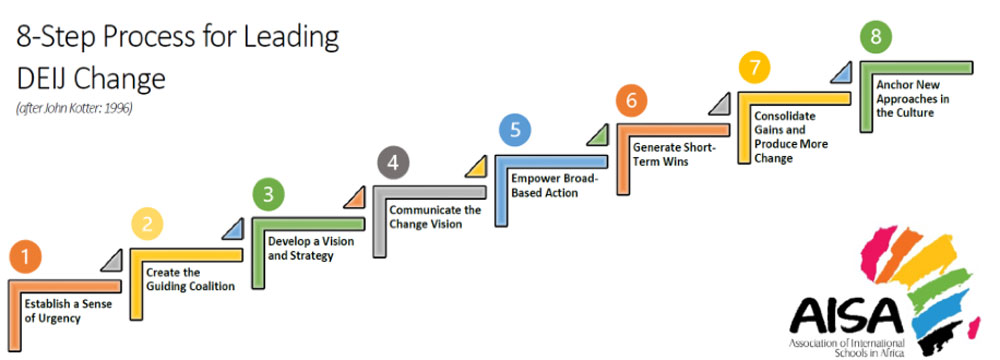
The foundation of any institution rests on its values and principles. As our community of the Association of International Schools in Africa (AISA) embark on establishing a robust Diversity, Equity, Inclusion, and Justice (DEIJ) framework across the region, the school leadership's strategic vision and commitment guide the process.
Understanding the need for change, school leaders initially must confront their own apprehensions and biases. As Lewin's "Unfreeze" concept[1] reminds us, this personal introspection catalyses larger, institution-wide transformation. Through self-awareness tools, DEIJ seminars, and reflective practices, leaders educate themselves and set a precedent for the entire community to follow.
Leadership's role, however, doesn't stop at self-growth. It extends to creating spaces for open dialogue within the school. By organizing forums and workshops, they equip the school community with knowledge and demonstrate the institution's commitment to DEIJ. These aren't merely events but strategic investments. Every seminar attended, every workshop organized, and every open forum held is a testament to the priority DEIJ holds in the school's vision.
As the process evolves, the commitment of school leaders comes to the forefront in more tangible ways. Continuous professional development for staff, mentorship programs, and feedback mechanisms become pivotal. While school leaders often approve of these, they must also actively engage in them, ensuring that they are not just ticking boxes but are genuinely fostering growth.
Furthermore, their strategic role becomes even more pronounced in resource allocation. DEIJ is not just a philosophy; it's a practice. And practice requires tools, personnel, and time. Leaders must allocate budgets for DEIJ training, staffing, materials, and events judiciously. Their vision translates into policies ensuring that human, material, or financial resources are effectively utilized in service of the DEIJ work.
With foundational understanding and dispositions in place, leadership scaffolds the translation of DEIJ principles into actionable strategies. They collaborate with educators in revisiting the curriculum, ensuring diverse perspectives are represented. They also champion restorative justice practices and community partnerships, ensuring the school environment and its extended community echo the principles of DEIJ.
However, what truly underscores leadership's role in this journey is their continuous engagement. They aren't passive observers but active participants. Their commitment to learning, openness to feedback, and proactive approach to fostering collaborations within and outside the school community are what make the DEIJ integration not just a radical dream but a feasible, actionable reality.
John Kotter's 8-Step Process for Leading Change[2] offers a structured approach to facilitating and consolidating change in organizations. Below are some actionable strategies for constructing a pathway to transformation grounded in diversity, equity, inclusion, justice, and belonging.

The journey of integrating DEIJ into the culture of AISA schools is indeed challenging and complex, but with the steadfast commitment of leadership, it's not just doable but can become a defining pillar of our member schools' identity. In this journey, leadership is both the compass and the keystone, guiding and cementing in place the structural change required.
References
[1] Lewin, K. (1947) Group Decision and Social Change. In: Newcomb, T. and Hartley, E., Eds., Readings in Social Psychology, Holt, Rinehart & Winston, New York, 197-211.
[2] Kotter, J.P. (1996) Leading Change. Harvard Business School Press, Boston.
--------------------------------------------------------------
Born in Australia, Dr. Peter Bateman has worked in the education sector in Africa for the past 30 years. In his current role as the Executive Director of the Association of International Schools in Africa (AISA), he has developed a particular interest in supporting effective school Governance and Leadership as well as designing differentiated approaches that support professional learning for international educators in the African context. More recently, he has been engaged in the “deep thinking” required for international schools to consider the “work” required to embed DEIJ in AISA schools.
Having been an educator and administrator in international schools, Peter also has an interest in developing and facilitating online Communities of Practice that enable collaboration and the sharing of learning experiences that mutually enhance educators' practice. He also has an interest in exploring how the skills of international educators can authentically enhance those of local educators via outreach programmes.
Peter holds a doctorate in education (United Kingdom), a master's degree in Micro Technology in Education (United Kingdom), a bachelor of education degree (Australia), and a post graduate diploma in Online Instruction (United States of America).
He was recently selected to participate in the Leadership for the 21st Century program at the Harvard Kennedy School.